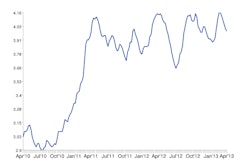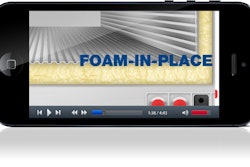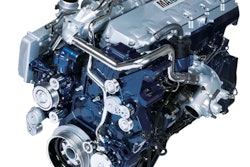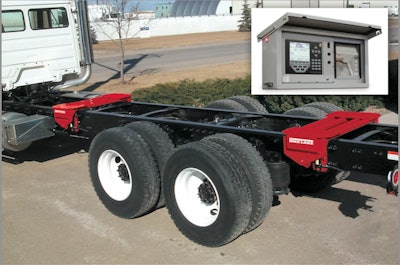 http://www.overdriveonline.com/agency-studying-whether-eobrs-can-be-used-to-harass-drivers/
http://www.overdriveonline.com/agency-studying-whether-eobrs-can-be-used-to-harass-drivers/Weight is an important variable for carriers that transport bulk and refrigerated commodities. It has a measurable impact on revenue, cost, compliance and safety. Equipping a fleet with onboard load scales gives drivers a quick way to ensure the payload is legal and optimized before leaving the pickup location.
Onboard scales come in both mechanical and electronic configurations. Both display the on-ground weight of a tractor, trailer and combination vehicle, but electronic scales also can send information to the office, where it can be integrated with billing and other processes. Electronic weighing remains in its infancy but is gaining traction.
For the drivers
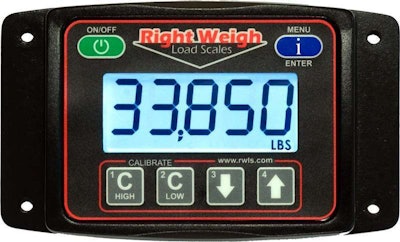 Right Weigh’s E-Z Weigh electronic scales are designed for drivers to check weights to maximize payload and see if their axle weights are safe and legal.
Right Weigh’s E-Z Weigh electronic scales are designed for drivers to check weights to maximize payload and see if their axle weights are safe and legal.Right Weigh offers an economical set of onboard scales to display weights. The E-Z Weigh electronic scale retails for $295, and the company’s mechanical scales range from $100 to $200. Both models are designed for drivers to check weights to maximize payload and see if their axle weights are safe and legal. The electronic scale accounts for about 35 percent of Right Weigh’s sales.
Most customers, which include fleets and drivers, prefer Right Weigh’s mechanical gauges because of the lower cost and their simple, reliable and durable design, says Scott McCulloch, director of communications and international business development. Right Weigh offers two models of mechanical gauges: The 510 is a dash-mount version for the tractor, while the 310 is an exterior-mount version for the trailer.
For the office
In addition to allowing drivers to check weight, fleets may find additional value in capturing weight information electronically and sending it to the office wirelessly for billing and other purposes.
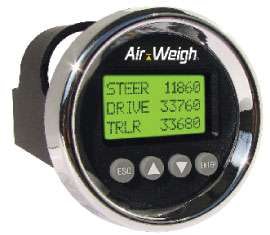 Air-Weigh’s LoadMaxx onboard scale can transmit tractor and trailer weight information from the truck to the office.
Air-Weigh’s LoadMaxx onboard scale can transmit tractor and trailer weight information from the truck to the office.Air-Weigh’s LoadMaxx onboard electronic scale displays the tractor, trailer and gross vehicle weight on a digital dash-mounted gauge. Trailer weights are transmitted from a sensor mounted on the trailer through the 7-way connector to Air-Weigh’s communications panel in the tractor.
The communications panel can transmit weight information to the vehicle’s J1939 communications channel, where it can be picked up by onboard computers and sent to the office. Through this integration, weights can be reported alongside vehicle odometer, time and position data.
Onboard computing providers can include the weights in form messages that drivers complete at pickups and deliveries. Currently, drivers typically send this information to the office using free-form messages, says Diane Rich, national sales manager for Air-Weigh.
For the customer
Digital or mechanical scales designed solely for checking weights do not meet the needs of every fleet. Those that deliver bulk products to customers on routes with multiple stops may need to capture the precise weights of product offloaded for billing purposes.
Rice Lake Weighing Systems’ TradeRoute onboard scale is designed to be accurate to within 5 to 10 pounds. TradeRoute, used primarily for straight trucks, uses a combination of frame-hugging steel weigh modules, a stainless-steel junction box and a control center.
Through the control center, carriers can capture details at each stop for the customer’s name, driver, product, date, time and weight. This information is stored and can be transmitted to the office electronically using USB drive or wirelessly via Wi-Fi and Bluetooth.
TradeRoute uses hydraulics to lift the body for a few seconds, then engages the load cells and allows the scale to self-level to get an accurate reading. The system costs between $10,000 and $14,000, says Tom Kendall, Rice Lake’s director of strategic accounts for onboard weighing.


